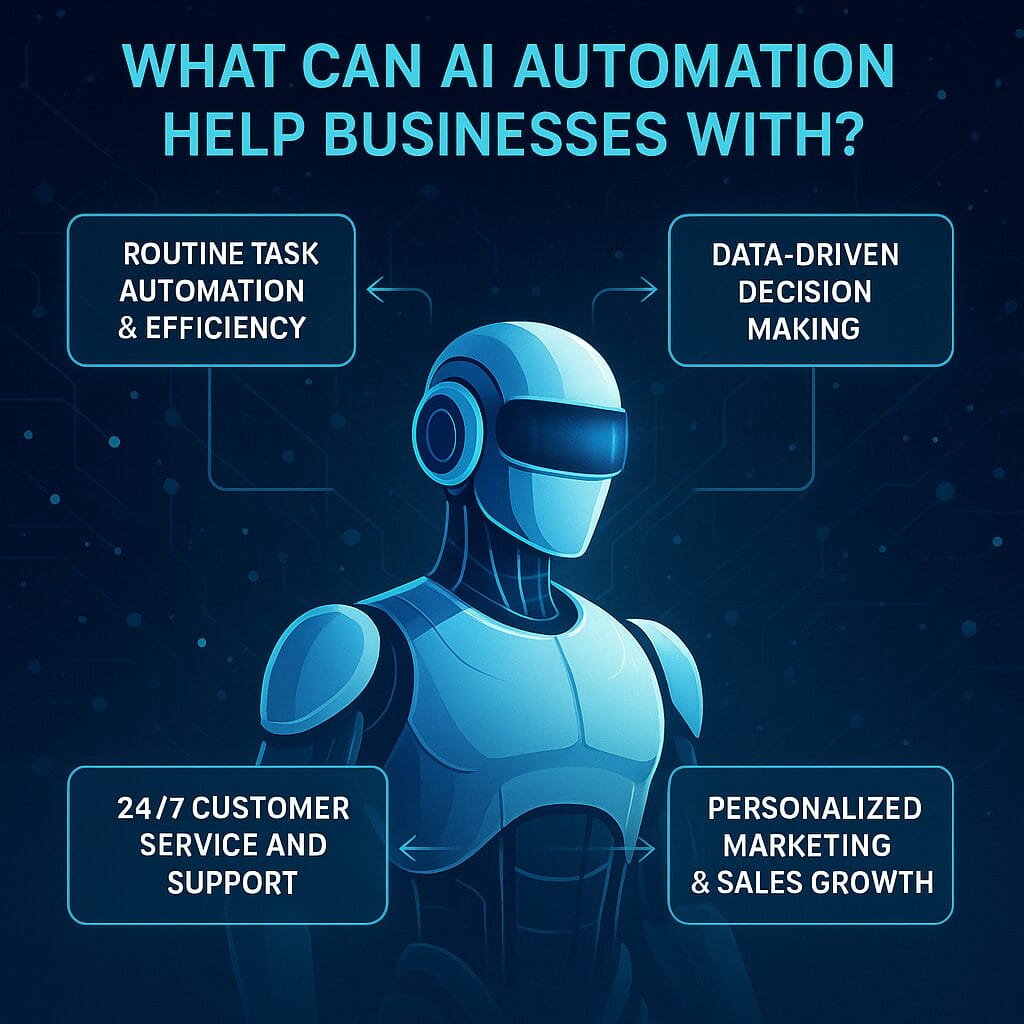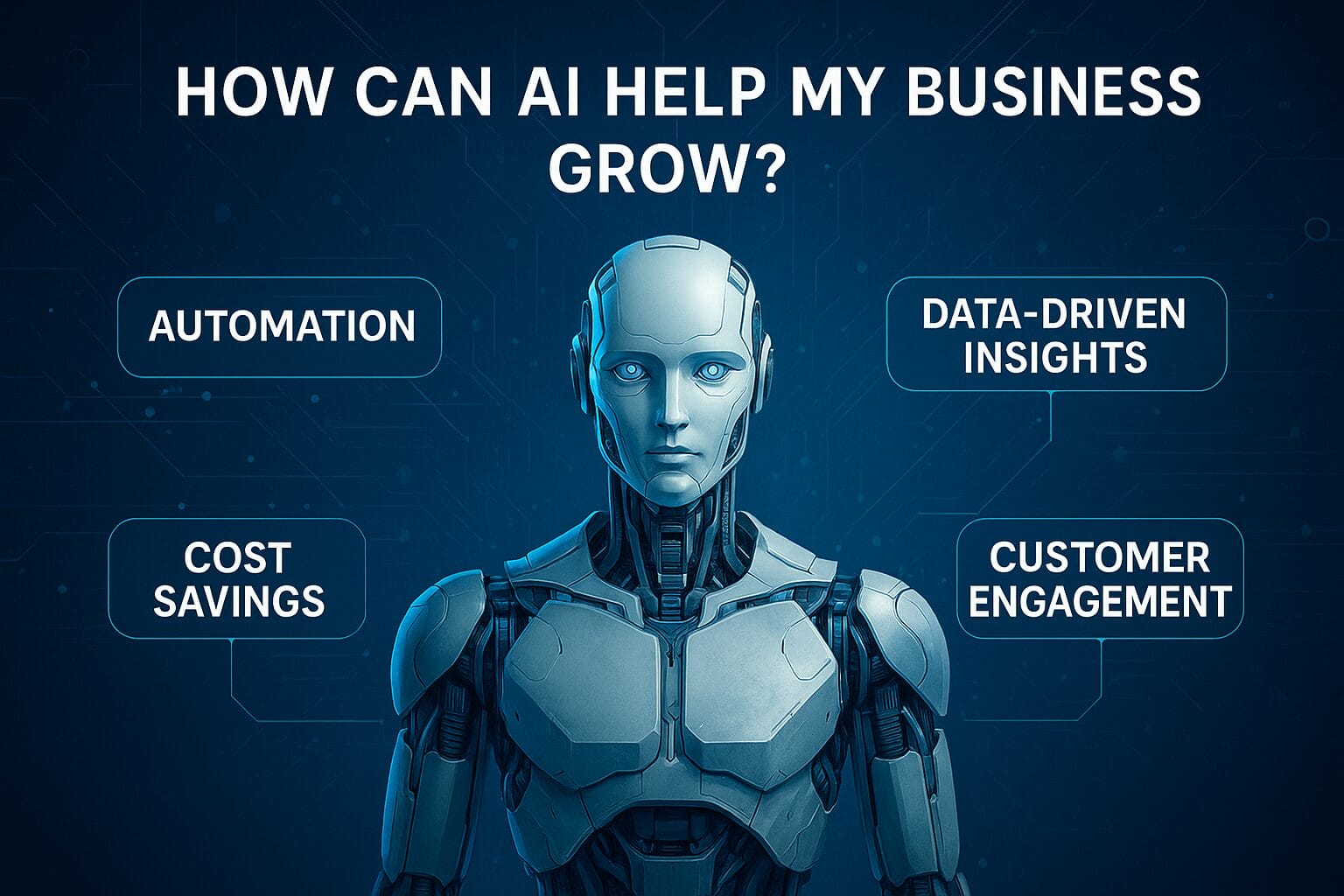
AI automation helps businesses by streamlining routine work, improving decision-making, and enhancing customer experiences. In essence, it allows companies to operate more efficiently, reduce costs, and even uncover new revenue opportunities through data-driven insights and personalized customer engagement. It’s no wonder adoption is widespread – today, 78% of companies use AI in daily operations, with…

AI automation helps businesses by streamlining routine work, improving decision-making, and enhancing customer experiences. In essence, it allows companies to operate more efficiently, reduce costs, and even uncover new revenue opportunities through data-driven insights and personalized customer engagement. It’s no wonder adoption is widespread – today, 78% of companies use AI in daily operations, with 90% either using or exploring AI for their organization. Below, we break down the top ways AI automation can benefit your business, each with real examples and stats to illustrate its impact.
In summary, here are six key areas where AI automation helps businesses:
- Routine Task Automation & Efficiency – Automate repetitive tasks (data entry, scheduling, etc.) to save time, minimize errors, and boost productivity.
- 24/7 Customer Service and Support – Deploy AI chatbots and virtual assistants to provide instant, round-the-clock customer support and faster responses.
- Personalized Marketing & Sales Growth – Leverage AI to analyze customer data and deliver targeted campaigns, recommendations, and lead scoring that increase conversions.
- Data-Driven Decision Making – Use AI analytics to uncover insights and accurate forecasts, enabling smarter business decisions based on hard data.
- Cost Reduction and ROI Improvement – Cut operational costs by automating labor-intensive processes and reducing errors, while increasing revenue through better targeting and efficiency.
- Innovation and Competitive Advantage – Accelerate innovation (e.g., faster product development) and stay ahead of competitors by using AI to adapt quickly to market changes.
How Can AI Automation Streamline Routine Tasks and Operations?
AI automation can take over repetitive, time-consuming tasks in operations so your team gets more done with less effort. By handling routine work – like data entry, invoice processing, appointment scheduling, or inventory updates – AI works tirelessly in the background, freeing employees to focus on higher-value projects. These systems operate 24/7 without breaks, delivering consistent results and reducing human error. The impact on productivity is dramatic: companies report that using AI leads to an average 40% boost in employee productivity, and 77% of executives confirm significant efficiency gains from their AI initiatives. For example, the global logistics firm DHL implemented AI algorithms to optimize warehouse staffing and workflows, improving operational efficiency while cutting costs. In short, AI acts as a tireless digital workforce handling the drudge work – you get more output in less time and often at lower cost, without needing to add headcount.
Businesses of all sizes can start by identifying repetitive processes that eat up staff hours. Tasks like generating reports, updating databases, or checking inventory levels are perfect candidates for AI automation. Modern AI-powered process automation (RPA) tools can integrate with your existing software to perform these actions automatically and accurately. The benefits go beyond just speed – AI systems are highly accurate and consistent, which means fewer costly mistakes. They can also scale easily: if your workload doubles, an AI bot can handle the increase without a drop in performance, something that would be hard to do with manual labor alone. By streamlining routine operations, businesses not only save time but also save money on labor and error-related costs. Many companies already report direct cost reductions from AI automation efforts. In today’s competitive environment, reclaiming those hours and dollars spent on menial tasks can be a game-changer for your bottom line.
How Can AI-Powered Automation Improve Customer Service?
AI automation enables faster, 24/7 customer service that keeps customers happy. Through AI-powered chatbots and virtual customer assistants, businesses can handle common inquiries instantly at any hour, without making people wait on hold. These virtual agents use natural language processing to understand questions and provide answers or solutions in real time. The result is that customers get help immediately, leading to higher satisfaction and loyalty. In fact, customer service is the number one use case for AI in businesses today – 56% of business owners already use AI for customer service tasks. This shows how critical AI-driven support has become for meeting modern customer expectations of instant, always-on service.
The advantages of AI in customer support are clear. Unlike human agents, AI chatbots never sleep and can handle multiple queries at once. An IBM report found that AI chatbots can resolve up to 80% of routine customer inquiries, which allowed companies to cut support costs by about 30% on average. These bots address FAQs, process orders, or troubleshoot basic issues, freeing your human representatives to tackle more complex, high-value customer needs. For example, telecom giant Vodafone deployed an AI assistant (“TOBi”) to handle customer requests – it now resolves 70% of all customer inquiries on its own, resulting in a 70% reduction in cost-per-chat after implementation. Customers appreciate the quick responses, and the business saves money by deflecting a huge volume of calls away from call centers. Moreover, today’s AI chatbots are far more sophisticated than the clunky bots of the past – they can understand natural language and context, escalating to a human only when needed. It’s no surprise that 67% of consumers say they actually prefer using AI assistants for simple customer service questions. By adopting AI automation in customer service, you ensure every customer gets prompt, personalized attention at any time, which boosts satisfaction and trust in your brand.
How Does AI Automation Enhance Marketing and Sales Performance?
AI automation can turbocharge your marketing and sales efforts by delivering personalization and insights at scale. In marketing, AI analyzes customer behaviors and demographics to tailor content and offers to the right audience at the right time. This means you can automate highly targeted email campaigns, product recommendations, and ads that resonate with individual customers – something that would be impossible to do manually for each person. The effect on revenue is significant: companies using AI for marketing and sales often see higher conversion rates because they’re reaching the right customers with the right message. For example, Amazon’s famous AI-driven recommendation engine suggests products you’re likely to buy – those personalized recommendations generate roughly 35% of Amazon’s total sales. Likewise, Netflix’s AI recommendation system drives about 75% of viewing activity by suggesting content tailored to each user’s tastes. These are powerful real-world proofs that AI-led personalization boosts engagement and sales.
Even if you’re not a tech giant, AI tools can dramatically improve your marketing ROI. AI can automatically segment your customers, identify high-value leads, and even create content. Generative AI tools now assist in writing marketing copy, social media posts, or product descriptions, saving your team countless hours. On the sales side, AI can score and prioritize leads (so your sales reps focus on the prospects most likely to convert), forecast sales trends, and suggest optimal pricing by analyzing market data. One global survey found the biggest revenue boosts from AI are coming in marketing, sales, and product development functions – in other words, AI is directly driving growth. If you want more examples or strategies on AI in marketing, be sure to explore our AI marketing services or read our latest insights on the WAIM Hub blog, where we cover how businesses can leverage AI for higher growth. Embracing AI automation in marketing and sales lets your company deliver the kind of personalized, data-driven outreach that turns prospects into loyal customers, all while making your campaigns more efficient and effective.
How Can AI Provide Better Data-Driven Decision Making?
AI automation empowers businesses with data-driven decision-making by quickly turning large data sets into actionable insights. Traditionally, analyzing business data (from sales figures to customer feedback to market trends) was a slow and manual process, often yielding limited insights. AI changes that by using machine learning algorithms to identify patterns, correlations, and anomalies in data that would be easy for humans to miss. As a result, business leaders can base their decisions on solid data rather than gut instinct. In practical terms, AI can crunch numbers and generate reports or forecasts in seconds – helping you answer questions like, “Which product lines will likely see increased demand next quarter?” or “Where can we cut costs without hurting quality?” For instance, retailers now use AI to forecast demand more accurately, preventing overstocking or stockouts by predicting what inventory is needed when. Marketing teams use AI analytics to automatically allocate budget to the most effective channels in real time. In finance, AI models can analyze years of financial data to spot expense trends or detect fraud patterns. All this translates to faster, smarter decisions across the organization.
The value of AI-enhanced decision support is backed by employee feedback: 83% of employees say the support AI provides for decision-making is a major benefit of adopting the technology. Essentially, AI can serve as a virtual analyst on your team that never sleeps – constantly sifting through live business data and alerting you to insights and opportunities. Have a hunch about a market trend? AI can validate it with data. Unsure which of your service offerings is the most profitable? AI can pinpoint it after analyzing customer behavior and costs. By automating data analysis, AI removes the guesswork and bias from many business decisions. This leads to outcomes like more accurate strategic plans, optimized operations, and even identification of new market opportunities that you might have overlooked. In short, AI gives you deeper visibility into your business. Companies that embrace AI analytics tend to react faster to changes (since they see them coming) and execute strategies with confidence because they’re backed by real evidence. In an era where data is the new gold, AI helps you mine it efficiently to inform every critical decision.
Can AI Automation Help Reduce Costs and Increase ROI?
Absolutely. AI automation reduces costs by cutting down manual labor and errors, while also boosting revenue – together delivering a higher return on investment (ROI). By taking over labor-intensive processes, AI directly lowers staffing and operational expenses. Tasks that once required a team of people (for example, processing invoices or performing quality inspections) can be handled by AI systems faster and often more accurately, saving salary costs and avoiding costly mistakes. A study by IBM showed that introducing AI “virtual agents” in customer support can reduce support costs by up to 30%, thanks to less need for 24/7 staff. In manufacturing, AI-based vision systems catch product defects early, which significantly cuts waste and factory rework costs. These efficiency gains add up to big savings on labor, time, and materials across various departments. In fact, many companies report immediate direct cost reductions after implementing AI in areas like customer service, operations, and supply chain. Simply put, automating processes with AI lets you do more with less – less human hours, fewer errors, and less downtime – which translates to lower operating expenses.
At the same time, AI often unlocks new revenue opportunities, boosting the other side of the ROI equation. By analyzing customer data and market trends, AI might reveal an untapped customer segment or an upsell opportunity that brings in additional income. AI-driven personalization in marketing tends to increase sales (as discussed earlier), and smarter forecasting means you can avoid lost sales due to stockouts or allocate resources to the most profitable activities. Companies using AI in their marketing and sales have seen higher conversion rates and revenue growth because they target customers more effectively. In essence, consider AI as an investment that can pay for itself: it trims your costs and simultaneously helps raise your revenue. It’s no surprise that in a global survey, the majority of businesses using AI indicated positive ROI results, citing both savings and revenue gains, especially in customer-facing functions. For a business owner focused on the bottom line, these are hard numbers to ignore. By reducing overhead and driving sales, AI automation delivers a compelling ROI that can surpass many traditional process improvements. When implemented thoughtfully, AI isn’t just a tech upgrade – it’s a profit improvement tool.
Can AI Automation Give Businesses a Competitive Edge?
Yes – adopting AI can be your secret weapon for innovation and competitive advantage in today’s market. Businesses that embrace AI automation often find they can do things better and faster than their competitors. Whether it’s launching an innovative product powered by AI, optimizing a supply chain with smart algorithms, or responding to customer trends in real-time, AI-powered companies tend to leap ahead. In contrast, companies that lag on AI risk falling behind the curve. Consider how early adopters like Amazon or Google gained dominant positions in part by doubling down on AI technologies; now even mid-sized businesses and startups are using AI to leapfrog established rivals by being more agile and data-driven. Implementing AI sends a signal to the market (and to your customers) that your company is forward-thinking and efficient. Over time, this tech capability becomes a moat that slows competitors’ struggle to cross.
The numbers underscore this shift: 83% of companies now prioritize AI in their business plans as a key driver of competitive advantage. Moreover, surveys show a majority of AI adopters credit it with boosting innovation internally, and nearly half have seen measurable improvements in customer satisfaction and overall differentiation thanks to AI initiatives. What does this look like in practice? AI might identify an emerging customer preference before anyone else notices, allowing you to develop a new offering or tailor your marketing while others play catch-up. AI can also accelerate research and development – for example, by using machine learning to design and test product prototypes virtually, companies can shorten their innovation cycles from months to days. In industries from finance to healthcare, firms using AI can adapt quickly to changing conditions (like shifting market demands or new regulations) because AI systems continuously analyze and learn from fresh data. This kind of rapid adaptation and foresight is a huge competitive edge. As we highlighted in one of our blog posts on AI as a “secret weapon,” leveraging AI allows you to outsmart and outpace competitors who rely on traditional methods. In summary, AI automation not only makes your current operations better, but it also opens the door to new innovations – helping your business stay ahead of the pack and even redefine the rules of the game in your industry.
Conclusion: Ready to Harness AI Automation in Your Business?
Implementing AI automation is no longer a futuristic idea – it’s a practical way to achieve better results across your business today. From streamlining operations and cutting costs to delighting your customers and driving revenue, the examples above show that AI can directly improve your bottom line. The key is to start with a clear strategy: identify which areas of your business (be it marketing, customer service, operations, or all of the above) stand to benefit most from AI, and begin with a high-impact project in that area. Ensure you have the right expertise or partner to support implementation and training, so your team is set up for success. Even a modest pilot project – like deploying an AI chatbot on your website or automating one step in a workflow – can quickly demonstrate value and pave the way for broader AI adoption.
Don’t let your business fall behind. Companies worldwide are investing in AI to innovate and grow; staying on the sidelines could mean lost market share or missed opportunities. Instead, take a proactive step toward an AI-powered future. If you’re ready to reap the benefits of AI automation, we’re here to help. Contact us at WAIM Hub, the AI-driven marketing agency, to discuss how we can tailor AI solutions to your company’s needs. Our team of experts can guide you in automating marketing campaigns, deploying intelligent chatbots, or turning your data into actionable insights – all to ensure your AI initiative delivers measurable results. Let’s transform your business with smart AI automation and secure your competitive advantage. Reach out to us today to kickstart your AI journey and start achieving more with automation!





